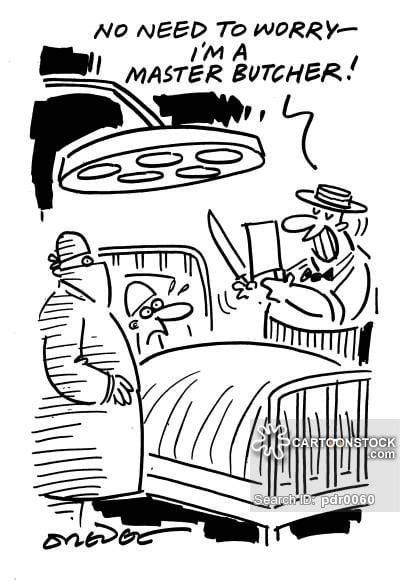The other day, my school friend was asking me, “How do you doctors manage to survive through all the blood and gore of an operation theatre and then be so calm about it?”
And it really got me thinking.
Indeed, some of the classes we have would make quite remarkable horror stories. Dissecting shriveled up, unrecognizable bodies in anatomy class; cutting open half rotten bodies during post mortem classes; taking out maggots from a diabetic ulcer…yes, they don’t make a pretty picture at all.
So, how do doctors manage to smile through all of these?

I’ve heard people commenting that doctors let go of emotions the moment they step into med school; some even go as far as to say that a doctor has the heart and constancy of a butcher!
You are grossly mistaken, dear readers.
When a girl or boy aged 17 years takes admission to a med school, she/he does it with a lot of aspirations. Believe me, EVERYBODY and I mean everybody feels nauseated on the first anatomy dissection class.
It is only after demonstrations spanning 2-3 classes that we are able to touch the cadaver.
However, you can sit at home and choose to ignore blood and gore which we can’t. We have to grit our teeth and stay because if we don’t learn, how are you going to be treated?
But it is not always rosy. Take it from me that people do faint. And also take it from me that they come back the very next day with renewed vigour and an insatiable desire to know more.
Personally, I feel it is this insatiable hunger for knowledge found in every medical student which keeps us going.

When we are entering the operation theater for the first time, we shiver involuntarily when we see the surgeon professor slicing open the abdomen like it is a slab of butter.
So, how is it that such scared medical students go on to become successful surgeons later on?
The answer again, lies in determination.
When we visit the OT, we feel nauseated for the first, second, third, fourth days…maybe for the first two weeks. But running from our fears have never been an option for us.
Once the student learns to focus more on the stone inside the gallbladder rather than the blood spilling everywhere, the job is half done.
Over time, we learn to appreciate the skill and mastery with which each incision is given. It may look like ‘butchery’ to some, but one incision gone wrong could cost us a life. Unlike ‘butchers’, we cut open to heal.
Another common misconception manifests itself with the phrase ‘doctors are apathetic.’
The modern version of the Hippocratic oath states, “I will remember that I do not treat a fever chart, a cancerous growth, but a sick human being, whose illness may affect the person’s family and economic stability. My responsibility includes these related problems, if I am to care adequately for the sick.”

How would you feel if your doctor was to cry and tell you that your loved one has stage IV cancer and has only a month to live? Allaying and not adding to your anxiety is an intrinsic part of our job. No matter how hopeless the clinical conditions may be, we cannot ethically be in tears in front of our patient.
For a doctor, there is hope as long as there is life. We are not apathetic to your loss. We have not gotten used to death, we never do. However, one cannot hope to be a successful doctor if one fails to master the art of stoicism.
Patients are not just a disease for us. Some of us develop ties with the patient though that is strictly unprofessional. But then, we are human after all.
When a patient dies, we feel the combined pangs of loss as well as a crippling sense of failure. Just like there is no greater joy than seeing a smiling patient going home, so is there no harsher torment than seeing a patient carried off for cremation.
The next time your doctor informs you of someone’s death with a poker face, know that his/her heart is not made of stone. It has taken hundreds of teary nights to finally achieve that face.
Let’s hope that now you know we are not heartless harbingers of horror. Rather we do what we do because, “The good physician treats the disease; the great physician treats the patient who has the disesase.”
Image Credits: Google Images
Other Recommendations:
http://edtimes.in/2017/03/doctors-wear-helmets-in-aiims-to-protest-against-another-doctor-being-kicked-like-a-street-dog/
http://edtimes.in/2017/03/private-hospitals-delhi-give-free-treatment-patients-heres/































